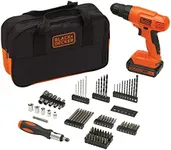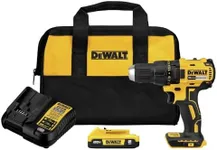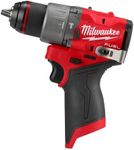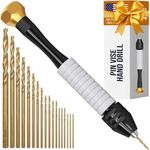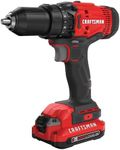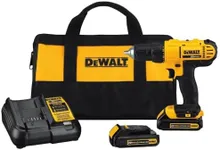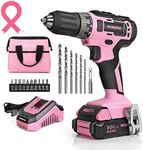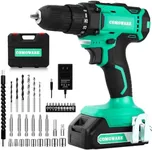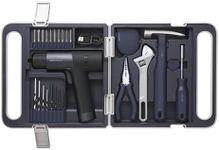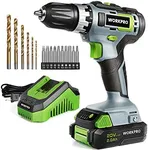Buying Guide for the Best Hand Drills
Choosing the right hand drill can make a significant difference in the ease and efficiency of your projects. Whether you're a DIY enthusiast or a professional, understanding the key specifications of hand drills will help you make an informed decision. Here are the main factors to consider when selecting a hand drill that best fits your needs.Power SourceHand drills can be powered by electricity (corded) or batteries (cordless). Corded drills offer consistent power and are ideal for heavy-duty tasks, but they require access to an electrical outlet. Cordless drills provide greater mobility and convenience, making them suitable for a variety of tasks, but their battery life can limit usage time. Consider where and how often you'll be using the drill to determine which power source is best for you.
Chuck SizeThe chuck is the part of the drill that holds the drill bit. Common chuck sizes are 3/8 inch and 1/2 inch. A 3/8 inch chuck is suitable for most household tasks and light-duty work, while a 1/2 inch chuck can handle larger bits and is better for heavy-duty tasks. Choose a chuck size based on the type of projects you plan to undertake.
Speed and TorqueSpeed is measured in revolutions per minute (RPM), and torque is the twisting force the drill produces. Higher speeds are useful for drilling into softer materials, while higher torque is needed for tougher materials like metal or masonry. Some drills offer variable speed settings, allowing you to adjust the speed and torque based on the task. Consider the materials you'll be working with to determine the appropriate speed and torque requirements.
Battery Life and TypeFor cordless drills, battery life and type are crucial. Lithium-ion batteries are popular due to their long life and quick charging times. The battery's ampere-hour (Ah) rating indicates how long it will last on a single charge. Higher Ah ratings mean longer battery life. If you plan to use the drill for extended periods, look for a model with a high Ah rating and consider purchasing an extra battery for uninterrupted work.
Weight and ErgonomicsThe weight and design of the drill affect comfort and ease of use. Lighter drills are easier to handle, especially for extended periods, but may not be as powerful. Ergonomic designs with comfortable grips reduce strain and fatigue. If you'll be using the drill frequently or for long durations, prioritize a model that feels comfortable and balanced in your hand.
Additional FeaturesSome hand drills come with extra features like built-in LED lights, which illuminate the work area, or keyless chucks, which allow for quick and easy bit changes. Other features might include a hammer function for drilling into masonry or a clutch for controlling torque. Consider which additional features will enhance your drilling experience and make your tasks easier.
